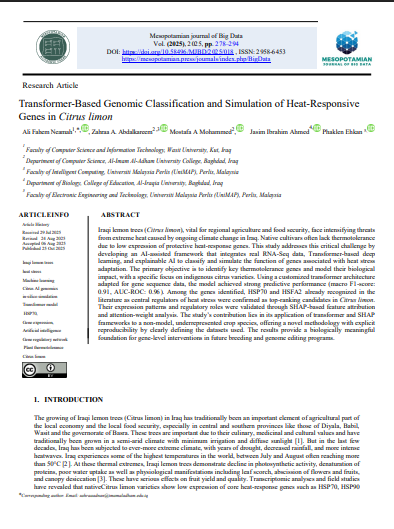Transformer-Based Genomic Classification and Simulation of Heat-Responsive Genes in Citrus limon
Main Article Content
Abstract
Iraqi lemon trees (Citrus limon), vital for regional agriculture and food security, face intensifying threats from extreme heat caused by ongoing climate change in Iraq. Native cultivars often lack thermotolerance due to low expression of protective heat-response genes. This study addresses this critical challenge by developing an AI-assisted framework that integrates real RNA-Seq data, Transformer-based deep learning, and explainable AI to classify and simulate the function of genes associated with heat stress adaptation. The primary objective is to identify key thermotolerance genes and model their biological impact, with a specific focus on indigenous citrus varieties. Using a customized transformer architecture adapted for gene sequence data, the model achieved strong predictive performance (macro F1-score: 0.91, AUC-ROC: 0.96). Among the genes identified, HSP70 and HSFA2 already recognized in the literature as central regulators of heat stress were confirmed as top-ranking candidates in Citrus limon. Their expression patterns and regulatory roles were validated through SHAP-based feature attribution and attention-weight analysis. The study’s contribution lies in its application of transformer and SHAP frameworks to a non-model, underrepresented crop species, offering a novel methodology with explicit reproducibility by clearly defining the datasets used. The results provide a biologically meaningful foundation for gene-level interventions in future breeding and genome editing programs.
Article Details
Issue
Section
Articles

This work is licensed under a Creative Commons Attribution 4.0 International License.
How to Cite
Fahem Neamah, A. ., A. Abdalkareem, Z. ., A. Mohammed, M., Ibrahim Ahmed, J. ., & Ehkan, P. (2025). Transformer-Based Genomic Classification and Simulation of Heat-Responsive Genes in Citrus limon. Mesopotamian Journal of Big Data, 2025, 278–294. https://doi.org/10.58496/MJBD/2025/018
